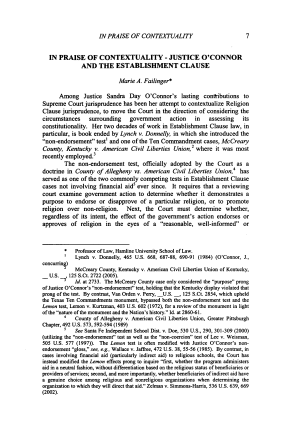In Praise of Contextuality: Justice O'Connor and the Establishment Clause
January 2006

DISCLAIMER: This text has been transcribed automatically and may contain substantial inaccuracies due to the limitations of automatic transcription technology. This transcript is intended only to make the content of this document more easily discoverable and searchable. If you would like to quote the exact text of this document in any piece of work or research, please view the original using the link above and gather your quote directly from the source. The Sandra Day O'Connor Institute does not warrant, represent, or guarantee in any way that the text below is accurate.
Article Text
(Excerpt, Automatically generated)
IN PRAISE OF CONTEXTUALITY - JUSTICE O'CONNOR AND THE ESTABLISHMENT CLAUSE
Marie A. Failinger*
Among Justice Sandra Day O'Connor's lasting conttibutions to Supreme Court jurisprudence has been her attempt to contextualize Religion Clause jurisprudence, to move the Court in the direction of considering the circumstances surrounding government action in assessing its constitutionality. Her two decades of work in Establishment Clause law, in particular, is book ended by Lynch v. Donnelly, in which she introduced the "non-endorsement" test' and one of the Ten Commandment cases, McCreary County, Kentucky v. American Civil Liberties Union, 2 where it was most recently employed.3
The non-endorsement test, officially adopted by the Court as a doctrine in County of Allegheny vs. American Civil Liberties Union,4 has served as one of the two commonly competing tests in Establishment Clause cases not involving financial aid5 ever since. It requires that a reviewing court examine government action to determine whether it demonstrates a purpose to endorse or disapprove of a particular religion, or to promote religion over non-religion. Next, the Court must determine whether, regardless of its intent, the effect of the government's action endorses or approves of religion in the eyes of a "reasonable, well-informed" or
•
I
concurrin )
Professor of Law, Hamline University School of Law.
Lynch v. Donnelly, 465 U.S. 668, 687-88, 690-91 (1984) (O'Connor, J.,
McCreary County, Kentucky v.
